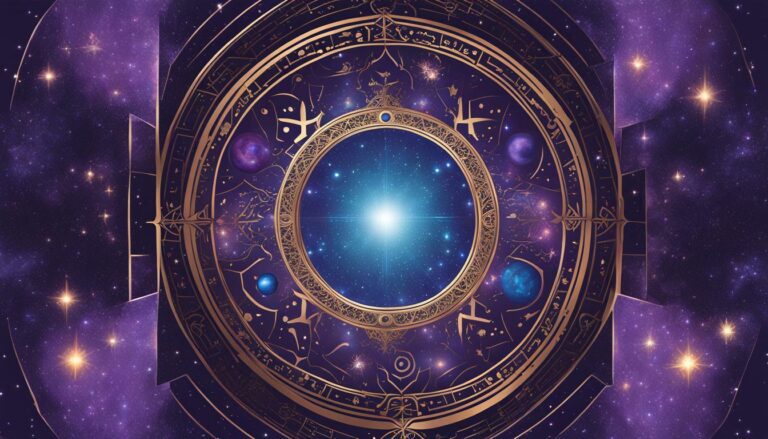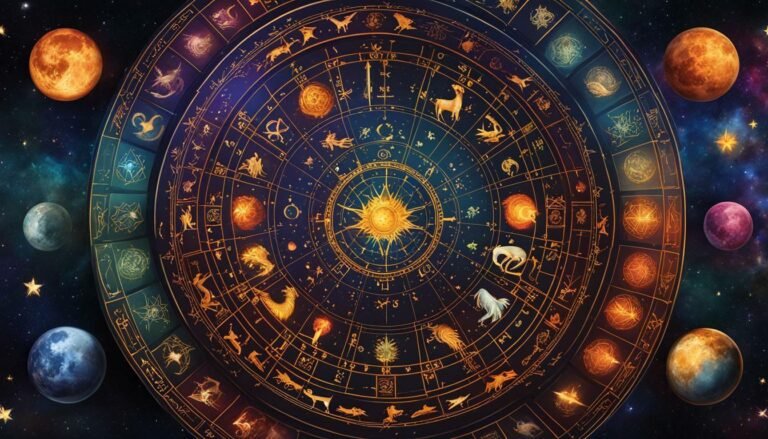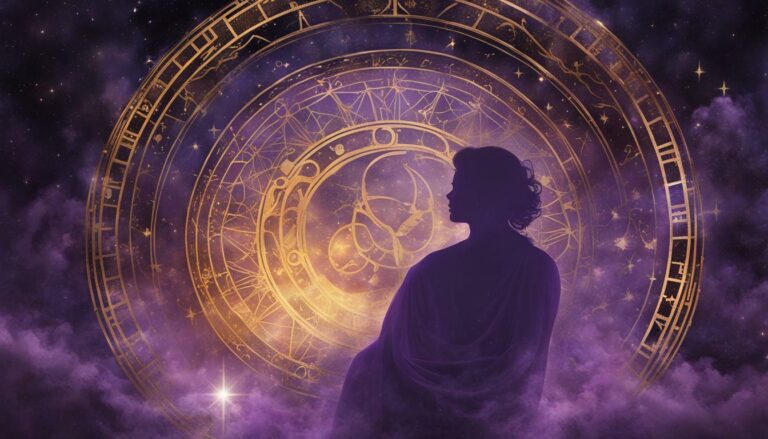How Does Astrology Work: Unveiling the Cosmic Connection
Welcome to the world of astrology! Have you ever wondered how the alignment of celestial bodies in the cosmos can impact your life on earth? Astrology is a fascinating field that explores the influence of planets, stars, and other celestial entities on human personality, relationships, and events. It is an ancient practice that dates back to millennia and is still prevalent today.
At its core, astrology believes that there is a meaningful connection between the universe and each individual. It suggests that each of us is a unique combination of energies, influenced by the position and movement of celestial bodies at the time of our birth. Astrology can help us understand our strengths, weaknesses, and potentialities, while also offering guidance for navigating life’s challenges.
Key Takeaways:
- Astrology explores the relationship between celestial bodies and human personality and events.
- Each individual is believed to have a unique combination of energies influenced by the position of celestial bodies at the time of their birth.
- Astrology can offer insights into our strengths, weaknesses, and potentialities.
The Role of Zodiac Signs in Astrology
Have you ever wondered why people born under the same zodiac sign often share similar personality traits? That’s because zodiac signs play a significant role in astrology.
There are 12 zodiac signs, each associated with a specific time of the year. Aries, Taurus, Gemini, Cancer, Leo, Virgo, Libra, Scorpio, Sagittarius, Capricorn, Aquarius, and Pisces are the 12 zodiac signs.
Each zodiac sign is linked to one of the four elements – fire, earth, air, and water – which are believed to represent different aspects of our personalities. Fire signs are associated with passion and energy, earth signs with practicality and stability, air signs with intellect and communication, and water signs with emotion and intuition.
Additionally, each zodiac sign is also linked to a ruling planet, which influences its characteristics. For example, Venus is the ruling planet of Libra, and it represents love and beauty, which aligns with Libra’s focus on harmony and balance.
The Characteristics of Each Zodiac Sign
Here is a brief overview of the characteristics associated with each zodiac sign:
| Zodiac Sign | Date Range | Element | Ruling Planet | Characteristics |
|---|---|---|---|---|
| Aries | March 21 – April 19 | Fire | Mars | Assertive, independent, energetic |
| Taurus | April 20 – May 20 | Earth | Venus | Practical, reliable, sensual |
| Gemini | May 21 – June 20 | Air | Mercury | Curious, communicative, adaptable |
| Cancer | June 21 – July 22 | Water | Moon | Intuitive, emotional, protective |
| Leo | July 23 – August 22 | Fire | Sun | Dramatic, confident, passionate |
| Virgo | August 23 – September 22 | Earth | Mercury | Organized, analytical, practical |
| Libra | September 23 – October 22 | Air | Venus | Harmonious, diplomatic, romantic |
| Scorpio | October 23 – November 21 | Water | Pluto | Intense, mysterious, passionate |
| Sagittarius | November 22 – December 21 | Fire | Jupiter | Courageous, optimistic, adventurous |
| Capricorn | December 22 – January 19 | Earth | Saturn | Ambitious, responsible, disciplined |
| Aquarius | January 20 – February 18 | Air | Uranus | Original, independent, humanitarian |
| Pisces | February 19 – March 20 | Water | Neptune | Empathetic, imaginative, romantic |
Understanding your zodiac sign can provide valuable insights into your personality, strengths, and weaknesses. It can also help you recognize your potential and navigate challenges more effectively.
The Power of Planets in Astrology
Astrology is the study of the movements and positions of celestial bodies, including planets and stars, and their influence on human lives. Within astrology, the planets hold a significant place of importance. Each planet is believed to emit a specific energy that governs different aspects of our lives.
The Sun, Moon, Mercury, Venus, Mars, Jupiter, Saturn, Uranus, Neptune, and Pluto are the ten planets used in astrological calculations. Each planet is associated with a specific zodiac sign, and their positioning within the zodiac at the time of your birth determines your birth chart.
Each planet in astrology represents a different energy or theme. For instance, the Sun is associated with one’s sense of self, ego, and identity, while the Moon signifies emotions, intuition, and nurturing. Mercury represents communication, logic, and intellect, and Venus is connected to love, beauty, and harmony. Mars is associated with ambition, passion, and aggression, while Jupiter is associated with growth, expansion, and optimism. Saturn represents discipline, responsibility, and structure, Uranus signifies innovation, eccentricity, and change, Neptune represents imagination, intuition, and spirituality, and Pluto represents transformation, power, and rebirth.
Interactions between planets can also influence our lives. The relative positioning of planets in our birth chart gives insight into our personalities, strengths, weaknesses, and challenges. For instance, a favorable interaction between Venus and Mars can indicate a harmonious balance between passion and love, while a challenging interaction between Saturn and the Moon can indicate difficulties with emotional expression and sensitivity.
The complex interplay between planets and their positioning at any given time also forms the basis for horoscope predictions. Understanding the influence of planets and their interactions is crucial for unlocking the insights astrology can offer.
Unraveling Horoscopes: Mapping Your Personal Destiny
Horoscopes are a fundamental part of astrology, offering insights into your life events and future. They are created based on the positions of planets at the time of your birth, which are then interpreted to create a unique birth chart.
Your birth chart is essentially a map of the sky at the moment you were born. It reveals the positions and relationships of planets, zodiac signs, and astrological houses, providing valuable information about your personality, strengths, weaknesses, and life path.
Through the interpretation of your birth chart, astrologers create horoscopes that offer predictions and insights into different aspects of your life, such as relationships, career, finances, and health.
“Your horoscope is not a roadmap carved in stone. Instead, it is a tool that can help you gain a better understanding of yourself and your life events. It is up to you to use this tool to create the life you want.”
Horoscopes can be found in newspapers, magazines, and online portals. However, it is important to note that generic horoscopes only provide a general overview of astrological influences, and may not be specific to your individual birth chart.
If you’re looking for a more personalized horoscope, it is recommended to consult with a professional astrologer who can offer a deeper analysis of your birth chart and provide more accurate predictions and guidance.
The Science Behind Astrology: Challenges and Debates
Astrology has long been the subject of debate among scientists and the general public alike. While many people swear by its accuracy and insights, others dismiss it as pseudoscience with no real basis in fact. So, what is the science behind astrology?
One of the main criticisms of astrology is that there is no scientific proof that it actually works. While astrologers claim that the planets and stars have an impact on our lives, there is no empirical evidence to support this theory. In fact, a number of scientific studies have shown that there is no correlation between astrological predictions and real-world events.
Despite this, many people continue to believe in astrology, often citing personal experiences or anecdotal evidence as proof of its validity. The question is, can astrology be explained using science? Some researchers have attempted to do so, looking at the psychological and neurological factors that may influence our belief in astrology.
For example, some studies have shown that people who believe in astrology tend to have a greater need for control and a higher level of anxiety. This could suggest that astrology offers a sense of comfort and predictability in an uncertain world. Others have suggested that our brains are wired to seek patterns and meaning in random events, which could explain why we find astrological predictions compelling.
However, while these theories may shed light on why people believe in astrology, they do not provide any evidence to support its accuracy. So, is there any scientific basis for astrological calculations? Many astrologers use complex algorithms to determine the positioning and interactions of planets, but these methods have not been validated by the scientific community.
Ultimately, whether or not astrology is a legitimate science remains a matter of opinion. While there is no conclusive evidence to support its claims, many people find comfort and guidance in the insights it provides. As with any belief system, the value of astrology lies in its ability to offer meaning and purpose to our lives.
The Conclusion: Embracing the Principles and Concepts of Astrology
Now that you’ve gained an understanding of astrology principles and concepts, you may be wondering how you can apply this knowledge to your life. Astrology is a personal journey, and interpretation is key. Your birth chart is unique to you, and you have the power to interpret it in a way that resonates with you.
Remember, astrology is not a one-size-fits-all solution. It’s a tool to help guide you and offer insights into your life. Take what you’ve learned and explore astrology further. There are countless resources available online, from blogs to forums, that can help you continue to learn and grow in your astrology practice.
As with any practice, there will always be skeptics and criticisms. But keep an open mind and trust in your own interpretations. And above all, have fun with astrology! It’s a fascinating and complex field that has been studied for centuries, and there is always more to uncover.
FAQ
Q: How does astrology work?
A: Astrology is based on the belief that there is a cosmic connection between the movements of celestial bodies and events that occur on Earth. It uses the positions of planets, stars, and other celestial bodies at the time of a person’s birth to create a birth chart, which provides insights into their personality traits, behaviors, and life events.
Q: What are zodiac signs?
A: In astrology, zodiac signs are a key component. There are twelve signs, each associated with a specific period of the year and represented by a symbol. These signs, such as Aries, Taurus, and Cancer, are believed to influence our personality traits and characteristics.
Q: How do planets influence astrology?
A: Planets play a significant role in astrology. Each planet represents different energies and exerts influences on various aspects of our lives. For example, Mercury is associated with communication and intelligence, while Mars represents action and passion. Astrological calculations are used to determine the positioning and interactions of planets in a person’s birth chart.
Q: What are horoscopes?
A: Horoscopes are astrological predictions or interpretations based on a person’s birth chart. They offer insights into various aspects of an individual’s life, including relationships, career, and personal growth. Horoscopes are created by analyzing the positions of planets at specific times and can provide guidance and predictions for the future.
Q: Is astrology considered a science?
A: Astrology is a subject of debate. While it is not considered a scientific discipline by mainstream science, it has a long history and is deeply ingrained in various cultures and belief systems. Its validity and accuracy are questioned by skeptics, but astrology continues to be studied and practiced by many people around the world.






